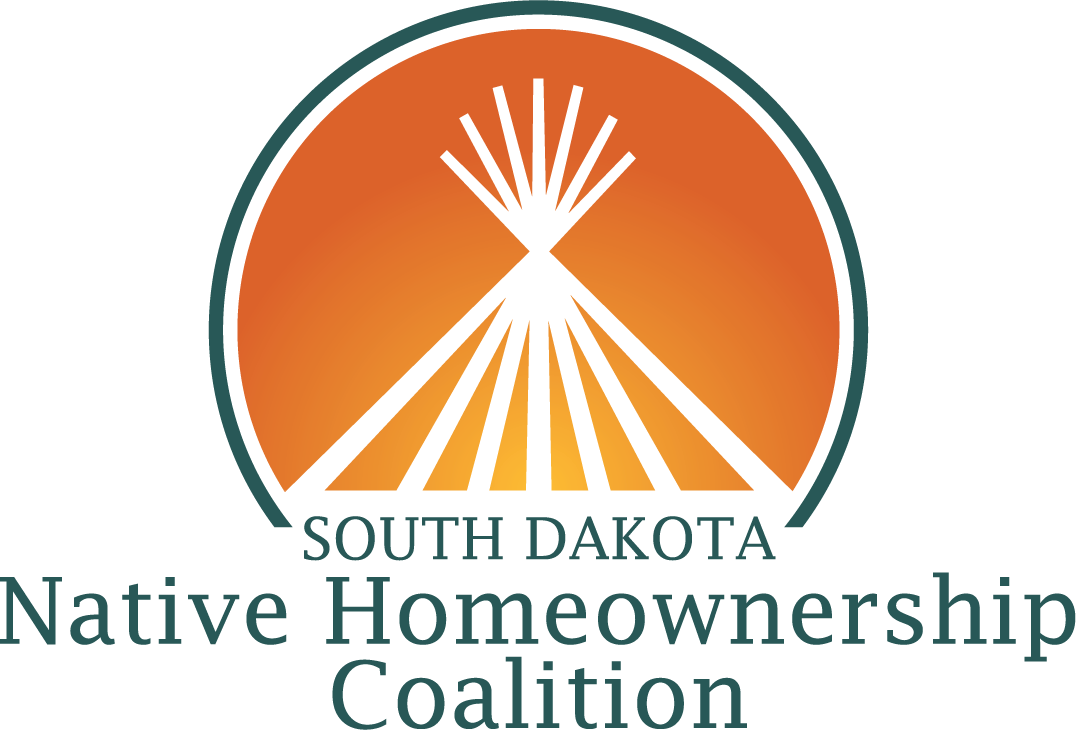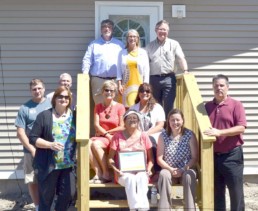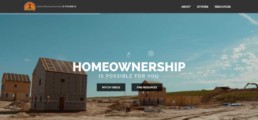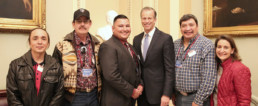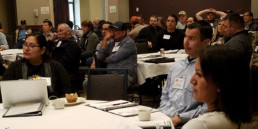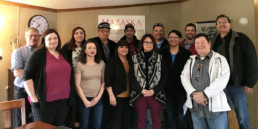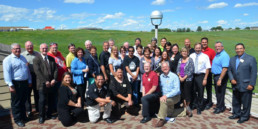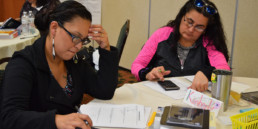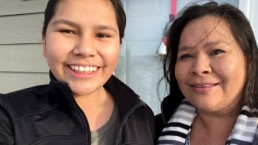Coalition Partners Join Forces to Make Homeownership Dream a Reality
In early June, Sherry Morgan, an enrolled member of the Crow Creek Sioux Tribe, realized her dream of homeownership with the help and support from several of our Coalition members. She now owns a home located on her parents’ leased land where she lived as a young girl.
In recognizing her great accomplishment, a celebratory event was held at Sherry’s home on June 5, 2018, and attended by several partner organizations, family, and community members. During the event, a Crow Creek elder blessed Sherry’s home, and an honor song was performed by the local drum group Bad Nation. USDA Rural Development Director, Julie Gross, presented Sherry with a certificate, and a meal was shared by all who attended.
During the event, Sherry said,
“The feelings are overwhelming for me as a first-time homeowner. Having this home built on the previous site of where my mom and dad lived makes it bittersweet.”
The innovative way in which Coalition members worked together created a path to homeownership for Sherry. This project is USDA Rural Development’s first 502 New Construction Direct Loan with the South Dakota Housing Development Authority’s Governor’s House Program on the Crow Creek Indian Reservation. USDA Rural Development leveraged the 502 Loan with Federal Home Loan Bank’s Native American Homeownership Initiative (NAHI) program through Dacotah Bank, as well as the Crow Creek Housing Authority to assist Sherry with the purchase of the Governor’s House. She also received funds through the Homes are Possible, Inc. (HAPI) grant program for closing costs.
Although Sherry’s homeownership journey was nearly two years, she was driven and committed through the entire process. She hopes that by sharing her story, it will inspire others to jump in with both feet to obtain homeownership.
Coalition Launches “Native Homeownership is Possible” Campaign
We are pleased to announce that we have launched our “Native Homeownership is Possible” campaign through a new website at www.nativehomeownership.com. The website includes a series of short videos designed to:
- Raise awareness of the concept of homeownership in reservation communities.
- Implore that homeownership is possible for Native Americans.
- Inspire and encourage Native American individuals and families to start on the path to homeownership.
In addition, the website features contacts listed by reservation and off-reservation areas that people can access to start on their path to homeownership.
We encourage all of our stakeholders to share these inspiring videos to help spread the message that “Native Homeownership is Possible.”
Coalition Members Head to Washington to Advocate for Native Homeownership
Earlier this month, representatives of the Coalition’s Policy Committee traveled to Washington, DC to advocate for policies to promote Native homeownership in conjunction with the National American Indian Housing Council (NAIHC) Legislative Conference. While in DC, the delegation held meetings with representatives from US Department of Housing and Urban Development, US Department of Agriculture, and US Department of Veterans Affairs (VA). The delegation discussed the proposed 502 relending demonstration (where Native CDFIs would relend 502 funds to qualified borrowers) as well the HUD 184 guaranteed loan product and strategies to increase the number of Native American Direct Loans (NADL) originated by the VA. The delegation also meet with the North Dakota and South Dakota Senators, and Senate Committee on Indian Affairs staff.
Featured in image: Members of the SD Native Homeownership Coalition met with Senator John Thune (R-SD) to discussion Native homeownership. From left to right, Mark Witt, Rosebud Tribal Veteran Service Officer (TVSO); Robert Dunsmore, Cheyenne River Sioux Tribe TVSO; Darrel Hernandez, Oglala Sioux Tribe TVSO; Senator John Thune; JC Crawford, Executive Director, Sisseton Wahpeton Housing Authority; and Joanna Donohoe, Co-Facilitator, SDNHOC.
Coalition Working on Multiple Fronts to Support Native Construction Industry
Recognizing that the lack of housing stock is a real barrier to homeownership in Native communities, the Coalition is working hard to support local contractors and encourage them to build more homes. We are excited about developing the following programming to support our Native construction industry:
Construction Internship Pilot Program – Summer 2017
After hearing from contractors that finding employment-ready workers is a challenge, in summer 2017, the Coalition launched a pilot internship program to place building trades students from Oglala Lakota College with local contractors. Through the program, students on the Pine Ridge and Cheyenne River Reservations gained valuable hands-on construction experience, while contractors had the chance to test out potential employees in a risk-free setting. The program was managed by our Native CDFI partners – Four Bands Community Fund on Cheyenne River and Lakota Funds on Pine Ridge – who also provided financial education classes to participants. Based on input from interns, contractors, and partners, the program was a huge success; of the 11 students who completed the internship, 9 received job offers from their contractors.
Building on this success, we plan to expand to additional tribal communities in summer 2018. To learn more about the construction internship program, click below to download your copy of the program report.
Contractor Workshop – Jan 31, 2018 – Rapid City
In January 2018, the Coalition’s Veterans Committee organized a one-day workshop for contractors focused on how to work with loan products available for building on trust land. With over 65 participants and contractors from around the state, the workshop was very well attended, and feedback was overwhelmingly positive.
According to one contractor:
“It was a great turnout. A lot of beneficial information provided and networking.”
The day’s agenda included contractor and lender perspectives on working with the HUD 184 loan, information on the VA’s Native American Direct Loan (NADL) and USDA’s 502 loan, resources provided by Native CDFIs, and recognition of the summer 2017 interns and contractors.
Inspector Certification Training – February 27-March 2, 2018 – Rapid City
Understanding that the shortage of certified building inspectors can delay the construction process, the Coalition is also working to increase the number of certified inspectors working in tribal communities. Our goal is to have at least one certified inspector on each reservation in South Dakota. This winter, we held an intensive four-day training to prepare participants for the inspector certification exam, with the actual exam administered on the fourth day of the training. Thirty-one participants attended the training, a combination of independent contractors and housing authority staff. The training was conducted by the International Code Council (ICC), who sent their top instructors to work with our Coalition participants. Feedback about the training was extremely positive; in the words of one participant, “the training was extremely helpful and I appreciate the opportunity to participate.” Another participant stated, “I liked the training – best one I have been at.” Recognizing the value of building codes in providing safety standards, a number of participants have requested support to promote the adoption of building codes in their tribal communities.
Coalition Members Develop Innovative Approach to Increase Native Veteran Homeownership
Two Coalition members, Mazaska Owecaso Otipi Financial (Mazaska) and Lakota Funds, have teamed up to increase homeownership rates for Native American veterans through an innovative new approach that simplifies the path to homeownership. In late February, both organizations were present to support George O’Rourke and Darrel Hernandez as they closed their VA Native American Direct Loans (NADL) and took the final steps toward homeownership on the Pine Ridge Reservation.
Colleen Steele, Executive Director of Mazaska, explains the new approach was born out of listening sessions that were hosted by the Coalition. Through the listening sessions, she heard the stories of several Native American veterans and gained a solid understanding of the barriers they face in achieving homeownership.
“Some of the veterans we talked to had been trying to access mortgage products designed specifically for veterans for more than two years, and we realized that Mazaska could make things a lot easier for them,” says Steele.
Through the new model, Mazaska provides a construction loan to the veteran and then helps them refinance with the Veterans Affairs Native American Direct Loan once the home is constructed. Mazaska also provides homebuyer education and assistance throughout the loan process. Especially during the complex refinance, Mazaska and Lakota Funds work together to provide intensive support to the homebuyer and coordinate with the U.S. Department of Veterans Affairs to keep things moving forward.
George O’Rourke comments on his experience, “The Mazaska program helped make refinancing my home with the Native American Direct Loan a simple quick process. I would like to thank Veterans Affairs for working with Mazaska to create this opportunity for future veterans.”
“It was a long time coming,” says Darrell Hernandez. “I really appreciate the help I received from Mazaska to get the loan finalized so that my family could move into our new home. I am more committed than ever to work with the U.S. Department of Veterans Affairs to streamline the Native American Direct Loan process so that other Native veterans won’t have to wait so long.”
“Our Native American veterans have sacrificed a lot by serving our country. We are glad to serve them as they pursue their homeownership dreams,” says Steele.
Coming Soon: Membership Dues
Moving Towards Sustainability
Our Coalition is Launching Membership Dues!
Over the past three years, our Coalition has been discussing strategies to sustain our operations by diversifying our sources of revenue. To date, we’ve enjoyed terrific support from our funders on the local, state, and national levels.
Last fall at our Coalition planning meeting, we created an ad hoc membership committee to explore these issues more formally. The committee met several times to discuss and develop a membership dues strategy. After approval by the executive committee, the new membership benefits and dues structure is nearly final. We will be rolling out our new membership structure in the coming weeks.
We are excited to enter this new phase of growth of the Coalition. We have heard from many stakeholders how beneficial the Coalition’s activities have been to your operations. We look forward to continuing to collaborate with partners who share our mission to increase homeownership opportunities for South Dakota’s Native people to build strong and healthy communities.
Exciting Homebuyer Education Trainings on the Horizon
Based on the input of Committee members, the Coalition’s Homebuyer Readiness Committee is planning two exciting trainings this spring to support homebuyer practitioners working to teach and support new homebuyers in their communities. We invite you to participate in these classes! Registration information will be coming soon.
Designing and Strengthening Your Homebuyer Education Program
Many of our practitioners have attended financial education and homebuyer instructor trainings and are very familiar with different training curriculums. This training will go a step further – looking at how to design a homebuyer education program, or strengthen an existing program. Discussion will include:
- What should agendas cover?
- What activities can should be included?
- How should training modules be structured?
Through this training, participants will have an opportunity to:
- Engage in hands-on activities to expand and practice their facilitation skills
- Learn and test new interactive training activities
- Create participants’ and trainers’ agendas
- Develop pre- and post- training checklists
- Learn new concepts related to adult education methodology
The training will provide valuable opportunities for peer sharing and discussions, and time to for participants to enhance and strengthen their new and their existing financial and homebuyer education programs.
Creating a Healthy Home
Homeownership means more than budgets and monthly payments. Homebuyer educators can also share important information about home maintenance and creating a healthy home environment. In this class, we will look at practical energy-saving tips, how to make non-toxic, healthy cleaning products with readily-available materials, and how healthy homes contribute to healthy communities. We will also spend time looking at local, native plants and their uses.
Family Celebrates Homeownership this Holiday Season
During the Coalition’s annual site visit this past summer, we learned about the Eagle Nest Housing Development on the Pine Ridge Reservation and how some of our stakeholders were creating homeownership opportunities there. We are pleased to share this story about the first family in the development that has transitioned from renting to homeownership.
This holiday season, Cynthia Plenty Bull and her daughter will be celebrating in the same house they have lived in for the past six years. But this year, they will call the home their own. Cynthia is the first tenant in the 30-unit Eagle Nest Housing Development, originally built in 1997 as low-income rental housing, to make the move to homeownership.
For Cynthia, owning her own home means stability. This is especially critical on the Pine Ridge Reservation, an area with an extreme housing shortage where it is estimated that an additional 4,000 homes are needed to provide adequate housing for residents.
“When you are a homeowner, you don’t have to wonder when it will end or if your lease is going to increase and you won’t be able to afford it anymore,” Cynthia says.
When it was constructed, Eagle Nest Housing Development made history as the first Native American low-income housing tax credit development in America, and since then has provided families with affordable housing. The project was designed as a rent-to-own development, where families would have the option to purchase their homes. As the tax credit agreements have reached maturity, Lakota Funds, who owns the development and also an active Coalition member, is reaching out to current tenants and supporting those interested in transitioning from renting to homeownership.
“Although Lakota Funds has invested a lot into Eagle Nest over the last 19 years, our goal was never to turn a profit. It has always been about creating homeownership opportunities, and our board approved a sale price of the homes to make it affordable for the families in the area,” says Tawney Brunsch, the Executive Director of Lakota Funds.
Cynthia began her homeownership journey this summer by contacting Lakota Funds. Lakota Funds then referred Cynthia to Mazaska Owecaso Otipi Financial, a nonprofit loan fund that provides home loan products and also a Coalition member.
Cynthia comments, “They [Mazaska] would tell me step-by-step what to do. We sat down and they talked to us through the whole process. It wasn’t a scary thing.”
Working between the two partner organizations and her bank over the next five months, Cynthia was connected to all of the resources and capital she needed to reach her homeownership goals. Mazaska and Lakota Funds helped her with financial projections and budgeting to ensure the home purchase would be affordable. She worked with her bank to consolidate debt and lower monthly credit card payments. Cynthia also completed Mazaska’s homebuyer readiness course so she would know what to expect as a homeowner.
The nonprofits helped her identify a local contractor to plan out and estimate several renovations that she would roll into her mortgage loan. Mazaska was also instrumental in helping her access all of the subsidies she qualified for to offset down payment and closing costs, and make the home purchase more affordable. In addition, Mazaska provided the mortgage for Cynthia’s home purchase.
Cynthia closed her loan in October with zero down payment and closing costs, and her monthly payment on her 20-year mortgage is about the same as her rent payments were. Overall, she couldn’t have asked for a smoother transition from renting to owning. Cynthia now owns a 3-bedroom, 2-bathroom home with a new roof and windows, remodeled bathrooms, new flooring and paint, and many more upgrades.
She says that what she likes best about her new home is, “Everything is brand new to me, and everything is the way I like I it.”
Cynthia explains that her daughter, Tia, was instrumental in the renovations. They chose all of the materials together, and Tia provided input and some great ideas throughout the process.
“It was a really good experience for Tia, because when she grows up and wants to purchase another house she will know the steps,” says Cynthia.
In the meantime, Lakota Funds and Mazaska are helping more Eagle Nest families through the same home buying process. They anticipate that one more home loan will close by the end of the year and more will close in early 2018.
“It’s really exciting to see the momentum that Cynthia’s home purchase is creating. Now more families are inspired to go for homeownership,” says Tawney.
Coalition Members Learn How to Integrate Coaching into Homebuyer Readiness Programs
In November, 17 practitioners in the Native homeownership field completed a three-day training where they learned about new financial coaching methods to integrate into their programs. The training, hosted by the Coalition and co-facilitated by CNM Ingenuity and Seven Sisters Community Development Group, focused on a coaching model that is designed to empower clients. Different from the traditional case management model where practitioners advise clients, coaching asks powerful questions so that the client can identify their own goals and create their own path to attain those goals.
“This approach reminds me of how our elders talk to us. They allow silence and reflection so you know what you need to do,” says Vickie Oldman John of Seven Sisters who helped facilitate the training.
Training participants learned how to avoid reacting to crises along with several important components of coaching, such as whole body listening and personal self-talk. They also participated in several interactive exercises where they were able to put their new skills to the test.
“Learning the tools to be a financial coach has been an exciting process. It forces you to think outside the box to come up with creative questions,” says Kimberly Claymore from Cheyenne River Housing Authority.
The training also included a segment on how to integrate the coaching model into an organizational culture. This segment allowed participants to brainstorm ideas and develop plans on how to use this new method in their work with clients.
“Financial coaching is something I’ve been interested in since I began my job as an Individual Development Account coach. I plan to put my financial coaching training to immediate use,” said Elaine MatoTama Hece from the Oglala Sioux Tribe Partnership for Housing on Pine Ridge.
The financial coaching training was inspired out of a need expressed by the Coalition’s Homebuyer Readiness Committee who established it as a milestone to complete in 2017. All training participants received text book and a financial calculator.
Tribal Leaders Support Coalition’s Policy Recommendations
At its December meeting, the Great Plains Tribal Chairmen’s Association adopted two resolutions in support of the South Dakota Native Homeownership Coaltion’s policy recommendations to federal policymakers.
The first resolution supported legislative amendments to the US Department of Veterans Affairs Native American Direct Loan (NADL) program to improve homeownership opportunities for Native veterans on Indian reservations in South Dakota.
The second resolution supported other broader homeownership recommendations including:
- Support for the implementation of the USDA Rural Development 502 home loan relending pilot
- Funding for the Bureau of Indian Affairs Housing Improvement Program
- Improvements to the HUD Section 184 loan guarantee program to increase deployment on trust land
- Exploring new partnerships with Fannie Mae and Freddie Mac as part of their Duty to Serve implementation plans
The Coalition appreciates the support of Cheyenne River Sioux Tribe Chairman Harold Frazier, who introduced the resolutions. We look forward to continuing to collaborate with the Great Plains Tribal Chairmen’s Association and South Dakota’s tribal leadership and Tribal Veteran Service Officers to promote these policy changes.
